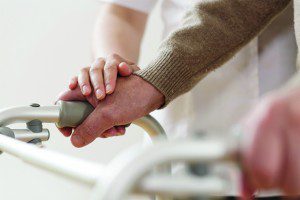By Matt Fehniger, PT Outpatient Coordinator, Life Care Center of Estero
 Losses occur at every stage of life, particularly in later years. As we age, we must cope with a variety of setbacks including physical, social and emotional setbacks, which may affect our ability to function independently, jeopardizing our freedom by relying on others for our needs. The extent to which we challenge these losses or accept and adapt to these losses affects the quality of life we achieve and maintain.
Losses occur at every stage of life, particularly in later years. As we age, we must cope with a variety of setbacks including physical, social and emotional setbacks, which may affect our ability to function independently, jeopardizing our freedom by relying on others for our needs. The extent to which we challenge these losses or accept and adapt to these losses affects the quality of life we achieve and maintain.
Physical Loss:
You may become aware of changes in your physical ability as you age. You may recognize challenges such as not remembering appointments, difficulty climbing stairs, opening jars or walking through the grocery store. Other changes may include:
• Vision and Hearing Problems
• Less Physical Energy
• Less Flexibility
• Less Stamina or Strength
• Deteriorating ability to Balance or Ability to move easily
Social Loss:
Physical losses can gradually limit an individual’s ability to participate in social activities they normally enjoy such as sports, cultural outings or even dining out. One example of this includes when a person with significant hearing loss, even with a hearing aid, might avoid social situations for fear of having to ask others to repeat themselves. Another example would be a person with heart disease who suffers from shortness of breath, ceasing to participate in their daily morning walk with their friends. Over time, these types of avoidance strategies limit contact with others could lead to fading friendships.
Emotional Loss
Loss if independence can create tremendous frustration, feelings of uselessness, and sadness, due to a loss of control in one’s life. For example, loss of mobility or vision may make necessary activities like going to the grocery store or attending medical appointments impossible without outside assistance. Being unable to do what used to be ordinary activities can be extremely frustrating. Another common frustration stems from loss of strength and balance which may require an individual to begin using an assistive device like a cane or a walker for the first time for safe mobility. While this may be necessary for safe mobility, many aging adults are resistant to this change due to feelings of frustration of this loss of independence. Some common reactions to this loss of independence include feelings of fear, anger, guilt, and confusion.
How Can I Cope with My Loss of Independence?
Be Patient: Losses are inevitable especially as you age. Acknowledge your losses and how these are effecting your life now.
Practice Self Acceptance: Recognize that losing independence is a common experience as people age, and not a sign of personal failure.
It is normal and natural.
Recognize Your Feelings: Allow yourself to feel sad and frustrated at times without putting yourself down for not being able to do what you used to do.
Remain Open: Trusted family and friends might offer suggestions about things you could try to make life easier. Think about and discuss these options rather than closing your mind to these possibilities.
Pursue New Experiences: Develop new friendships, interests, hobbies, and other activities that you can physically do.
Seek and Accept Help: Some loss of independence is inevitable and cannot be avoided. Occasionally we must utilize adaptive equipment or modify our activities to ensure safety with daily activities. Alternatively, if you notice a deterioration in mobility or balance, you may be able to overcome these challenges through a guided strengthening or balance program designed by a trained therapist. There is nothing wrong with seeking assistance to help you fight or minimize your individual loss of independence every step of the way.
We here at Life Care of Estero are here to improve the health of the community for which we serve. As part of this vision, we provide a team of highly skilled Physical, Occupational, and Speech Therapists and the latest in cutting edge rehabilitation technology such as the AlterG anti-gravity treadmill and the Biodex balance system to help you regain your independence and facilitate you reaching your personalized goals. Please call our outpatient rehabilitation department at (239) 495-4046 if you have any questions or think we can help you maintain your functional independence.
Reference: “CDC Promotes Public Health Approach To Address Depression among Older Adults” www.CDC.gov
“The Psychology of Aging” Paper by the Australian Psychological Association
Life Care Center of Estero
239.495.4000 | 3850 Williams Rd. | Estero, FL 33928 | www.lifecarecenterofestero.com










